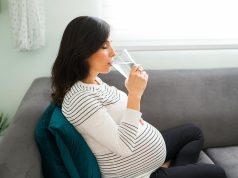Task force also concludes there’s too little information to recommend screening for deficiencies
TUESDAY, March 31, 2015 (HealthDay News) — Taking iron supplements during pregnancy doesn’t appear to significantly change any health outcomes for mother or infant, a new review shows. A second review — this one on infants and toddlers — found no evidence that iron supplements improved growth or development. The findings on pregnant women were released online March 30 in the Annals of Internal Medicine. The findings on children were published online March 30 in Pediatrics.
Both conclusions come from a U.S. Preventive Services Task Force (USPSTF) review of the latest research on iron supplementation and screening for pregnant women, babies, and young children. The USPSTF determined that there isn’t enough evidence to recommend that pregnant women or infants and children receive iron supplements or be screened for iron deficiencies. But, they also noted there isn’t enough evidence to recommend against either practice. The recommendations regarding prenatal supplements are an unchanged update from those in 2006. What’s new is that this study also finds no evidence to support routine screening.
Amy Cantor, M.D., lead author of the prenatal study and an assistant professor of obstetrics and gynecology and family medicine at the Oregon Health & Science University in Portland, and colleagues analyzed the evidence from 11 trials on pregnant women routinely taking iron supplements. They found that supplements didn’t affect women’s quality of life or rates of cesarean deliveries, underweight newborns, preterm birth, or infant death. The researchers did find that women’s iron levels improved with supplements. But, whether or not there is a benefit from this change is unclear, they said.
The findings in infants and toddlers were similar to those for pregnant women, according to Marian McDonagh, Pharm.D., a professor of epidemiology at the Oregon Health & Science University, and lead author of that study. McDonagh’s team reviewed 10 trials they identified that measured effects of iron supplements in children aged 6 months to 2 years. “Although some evidence on routine iron supplementation in children ages 6 to 24 months indicates improvements in hematologic values, limited evidence from controlled studies indicates no benefits in growth or neurodevelopmental test scores, and no other clinical outcomes have been evaluated in the literature for children living in developed countries,” McDonagh told HealthDay. “The effects of routine iron supplementation in young children are unknown at this time.”
Abstract – Annals of Internal Medicine
Full Text
Abstract – Pediatrics
Full Text
Copyright © 2015 HealthDay. All rights reserved.








